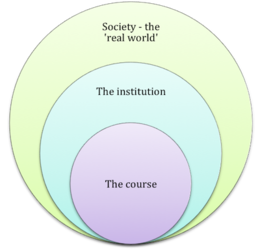Contextual factors
From WikiEducator
| Learning and Teaching in Practice | |
|---|---|
| Module 7: Learner-centred pedagogy and stakeholders | |
| Stakeholders | Introduction | Who are they? | Expectations of stakeholders | Contextual factors | Summary |
We have seen how stakeholders (both external and internal) provide essential input into the development, review and evaluation of a programme.
A course that is designed and maintained through an ongoing relationship with stakeholders is situated within a broader context. Without this relationship, the course is at risk of becoming isolated from the needs of stakeholders - the 'ivory tower' situation.
An effective relationship with industry and society helps ensure that graduates:
- Develop the capabilities needed by the workplace - the skills and knowledge needed for employment.
- Understand and can apply ethical behaviour and professional standards - these may be informal but widely accepted, or they may be formally defined.
- Are work-ready - they understand how the workplace functions and are prepared for the 'real-world'.
- Stay current with the latest developments and best practice in the industry - essential in times of rapid technological change.
- Can participate in society and make a worthwhile contribution - see the topic on Action competence
|
Consider your own course or teaching context:
|
